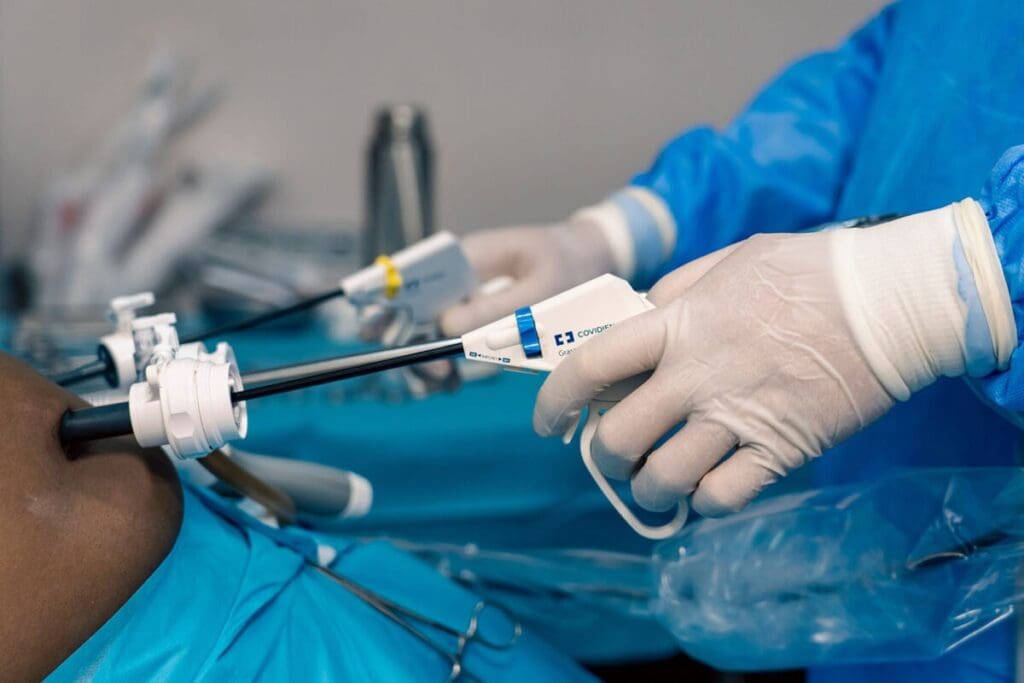Last Updated on November 24, 2025 by
When thinking about hernia surgery, many wonder if they’ll be asleep during it. The answer varies based on the hernia type and the patient’s health.
We’ll look at the anesthesia types used in hernia repair surgeries. Most hernia surgeries happen under general anesthesia, making patients sleep through the surgery. But local anesthesia is also used, mainly for smaller hernias or when the surgery is done as an outpatient.

Anesthesia is key in hernia surgery, making sure patients are comfortable. There are mainly two types: general and local anesthesia.
General anesthesia makes the patient sleep, so they don’t feel anything during surgery. It’s used for bigger or more complex hernias. It ensures the patient doesn’t feel pain or discomfort. Studies show no big difference in recovery or complications between general and local anesthesia for hernia repairs.

Local anesthesia numbs the area where the surgery happens, keeping the patient awake. It’s better for smaller hernias because it has fewer side effects and a quicker recovery. Patients can go home soon after, avoiding general anesthesia risks. The choice depends on the patient’s health, hernia type, and the surgeon’s skill.
Regional anesthesia, like spinal or epidural, might be used for some hernia repairs, too. The decision on anesthesia is made with the patient and the surgical team. They consider the patient’s needs and the situation.
Choosing between general and local anesthesia for hernia surgery depends on several factors. This choice is important for patients and is based on the hernia’s type, the patient’s health, and the surgeon’s opinion.
The type and location of the hernia are key in deciding on anesthesia. For example, umbilical hernia operations might need special consideration. The size and complexity of the hernia also play a role, with bigger or more complex ones often needing general anesthesia.

A patient’s health and medical history are vital in choosing anesthesia. Some patients might be better off with local anesthesia to avoid risks with general anesthesia. Others might prefer general anesthesia if they’re anxious or don’t want to be awake during surgery.
We look at several factors when assessing a patient’s health:
The surgeon’s preference and experience also matter. Surgeons with a lot of experience with local anesthesia might choose it for the right patients. They might say it’s better because it allows for early mobilization and same-day discharge. Local anesthesia is also very effective, with high patient satisfaction rates.
“The choice of anesthesia for hernia surgery is a multifaceted decision that balances the patient’s needs with the surgeon’s expertise.”
By looking at the hernia’s type, the patient’s health, and the surgeon’s preference, we can pick the best anesthesia for hernia surgery. This ensures the best results for the patient.
When you have hernia surgery, you might be put to sleep. This is a common practice to keep you safe and comfortable. Knowing what to expect can make you feel more at ease.
We give you detailed instructions before surgery. These include what to eat, drink, and any medication changes. We also review your medical history to spot any risks.
Pre-surgery preparation is key to a good surgery. We ask you to follow our instructions carefully. This includes eating and drinking rules and medication changes to get you ready for surgery.
On surgery day, you’ll get general anesthesia to sleep. Our anesthesiologist watches your vital signs during the surgery. This keeps you comfortable and pain-free.
The general anesthesia process is watched closely by our skilled anesthesiologists. They make sure you’re safely asleep and adjust the anesthesia as needed.
After surgery, you’ll go to the recovery room. Here, our team watches over you until you’re awake and stable. They check your vital signs and manage any pain or discomfort.
The recovery time depends on your hernia type and health. For small hernias, local anesthesia works well. But for general anesthesia, we focus on a smooth recovery.
Knowing what to expect can help you prepare for surgery and recovery. Our team is here to support you every step of the way, ensuring the best results for you.
Local anesthesia is a good choice for many patients undergoing hernia repair surgery. The patient is awake but doesn’t feel pain in the surgical area. We’re here to help you through this process.
With local anesthesia, patients are awake and can talk to the surgical team. This helps because they can give feedback right away. But about 35% of patients might feel some pain after surgery.
Advantages of Local Anesthesia:
Being awake during surgery has many benefits. It helps avoid the risks of general anesthesia. Plus, patients can tell the surgeon right away if something doesn’t feel right.
Local anesthesia works well for smaller hernias, like inguinal or umbilical ones. These are simpler and can be safely treated with local anesthesia instead of general anesthesia.
Local anesthesia is often used for:
These hernias are usually simpler and can be treated well with local anesthesia. Talk to your surgeon to see if this is the best choice for you.
Choosing between general or local anesthesia for hernia surgery depends on several factors. These include the type of hernia, the patient’s health, and the surgeon’s preference. Both options have their advantages and things to consider.
Local anesthesia is often preferred because it leads to higher patient satisfaction. It allows for early movement and discharge on the same day. This is a big plus for many patients.
A successful hernia repair is key to a smooth recovery. Knowing about different anesthetics and what to expect is important. It helps patients make better choices about their care.
Talking to a surgeon about individual needs and concerns is essential. This way, the best anesthesia option can be chosen. It ensures a safe and effective hernia repair.
Opting for the right anesthesia helps avoid complications like seroma. It also makes the recovery faster. This means patients can get back to their normal lives sooner.
Most hernia surgeries use general anesthesia. But local anesthesia is also common, mainly for smaller hernias or outpatient surgeries.
The choice between general or local anesthesia for inguinal hernia surgery depends on the hernia’s size and complexity. It also depends on the patient’s health.
Local anesthesia leads to a quicker recovery. It’s used for inguinal and umbilical hernia repairs. This is because it doesn’t have the sedative effects of general anesthesia.
General anesthesia is given on the day of surgery. It puts the patient to sleep. The anesthesiologist watches the patient’s vital signs during the surgery.
After surgery, the patient goes to the recovery room. They are watched until they are stable and awake. The recovery time varies based on the anesthesia type.
Recovery time for hernia surgery varies. It depends on the anesthesia type, hernia size and complexity, and the patient’s health. Some patients recover quickly with local anesthesia.
Yes, you should talk to your surgeon about your anesthesia preferences. Discuss your concerns and the best approach for your needs. Consider the hernia type and your health.
Several factors influence anesthesia choice. These include the hernia type and location, the patient’s health and medical history, and the surgeon’s preference and expertise.
Yes, local anesthesia is safe and effective for umbilical hernia repairs. It offers a quicker recovery and fewer complications.
General anesthesia is good for complex or large hernias. It ensures the patient is asleep during surgery. This makes the surgery painless for the patient.
Subscribe to our e-newsletter to stay informed about the latest innovations in the world of health and exclusive offers!